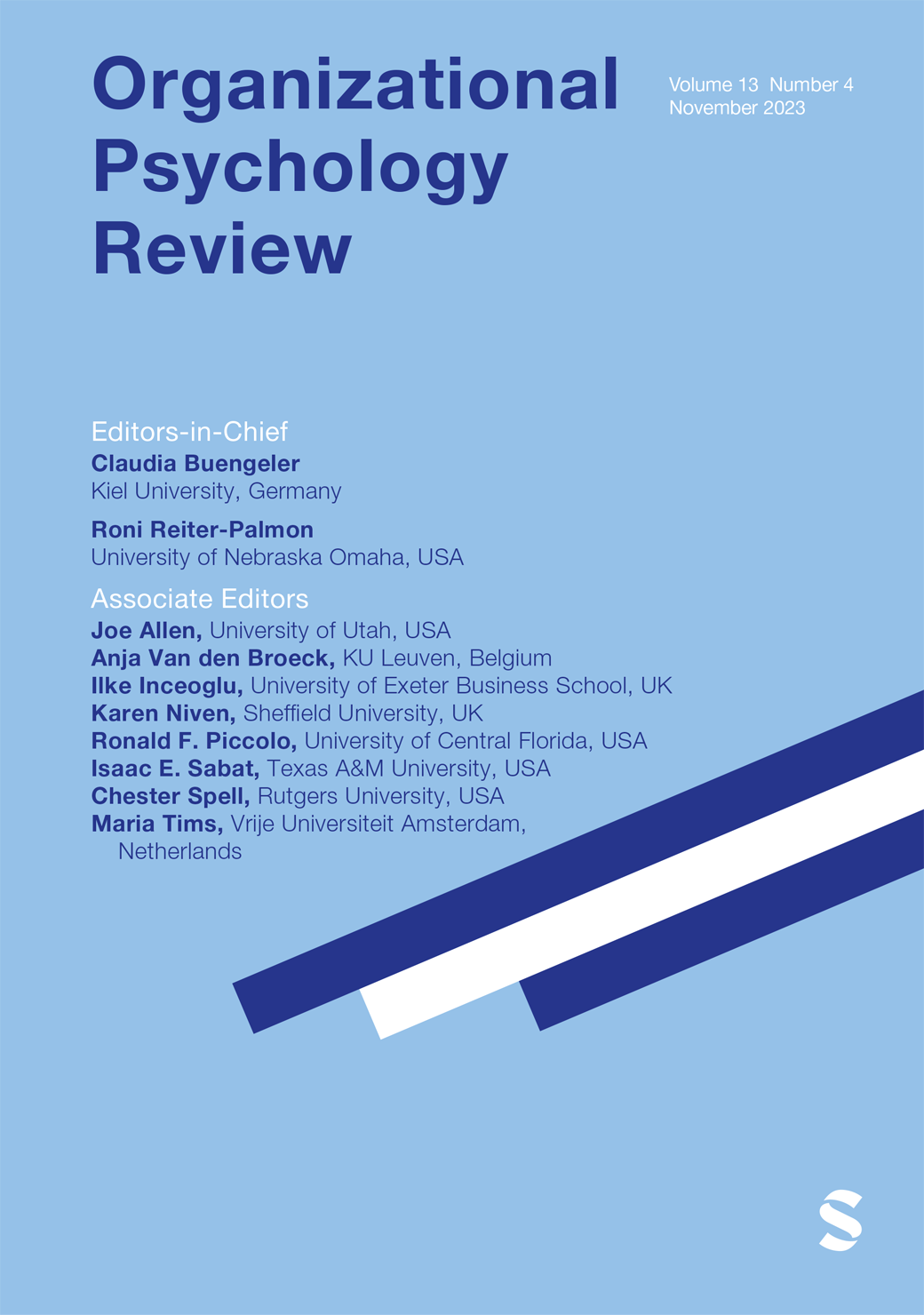危机时期的工作需求资源理论:新命题
IF 7.1
1区 心理学
Q2 MANAGEMENT
引用次数: 36
摘要
这篇理论论文提出了一个扩展的工作需求-资源(JD–R)理论,旨在了解组织及其员工如何最好地应对工作场所的新冠肺炎和其他危机。这场危机表明,仅凭工作特征不足以解释员工的健康和动机,即JD-R理论的两个焦点结果。相反,个人、家庭、工作和组织的需求和资源相互作用,以预测结果。此外,除了个人监管策略之外,还建议家庭、领导者和组织/团队的监管策略来改变需求和资源对结果的影响。这可以通过将危机管理文献纳入JD-R理论来实现。从工作设计的角度来看这场危机,有助于我们引入几个新的、可测试的命题,具体说明员工的福祉和职能如何受到危机和动荡时期的影响。简明语言摘要组织一直在努力了解其员工如何受到新冠肺炎大流行的影响,以及他们在大流行期间和之后可以做些什么来支持他们的福祉和改善他们的功能。员工个人的幸福感和工作表现很难预测,这在危机时期变得更加复杂。工作需求-资源理论是一种有用的方法,因为它表明员工的健康和动机是两个不同过程的结果,即健康损害过程和动机过程。工作需求,如工作压力和苛刻的客户,耗尽了员工的精力,从而降低了他们的健康,而工作资源,如自主性和社会支持,帮助员工处理需求并发展自己。疫情表明,个人、工作、家庭和组织的需求和资源之间的相互作用可以预测结果。此外,除了个人监管策略之外,还建议家庭、领导者和组织/团队的监管策略来改变需求和资源对结果的影响。从工作设计的角度看待危机有助于我们在工作需求-资源理论中引入几个可测试的命题,这些命题规定了员工的福祉和职能如何受到危机和动荡时期的影响。本文章由计算机程序翻译,如有差异,请以英文原文为准。
Job demands-resources theory in times of crises: New propositions
This theoretical paper presents an extended Job Demands–Resources (JD–R) theory aimed at understanding how organizations and their employees can best deal with COVID-19 and other crises in the workplace. The crisis showed that job characteristics alone are insufficient to explain employee health and motivation, i.e., the two focal outcomes of the JD-R theory. Rather, demands and resources of the individual, the family, the job and the organization interact with each other to predict outcomes. Moreover, next to individual regulatory strategies also the regulatory strategies of the family, the leader and organization/team are suggested to modify the impact of demands and resources on outcomes. This was possible by integrating the crisis management literature in JD-R theory. Viewing the crisis from a job design perspective helped us to introduce several new and testable propositions that specify how employee well-being and functioning are impacted by crises and turbulent times. Plain Language Summary Organizations have been struggling to find out how their employees are affected by the COVID-19 pandemic and what they can do to support their well-being and improve their functioning during the pandemic and beyond. The well-being and job performance of individual employees are difficult to predict which becomes even more complicated during times of crisis. The Job Demands–Resources theory is a helpful means because it suggests that employee health and motivation are outcomes of two different processes, i.e., the health impairment process and the motivational process. Job demands, such as work pressure and demanding customers, exhaust the energy of employees and consequently diminish their health, whereas job resources, such as autonomy and social support, help employees to deal with the demands and to develop themselves. The pandemic showed that the interplay between demands and resources of the individual, the job, the family and the organization predict outcomes. Moreover, next to individual regulatory strategies also the regulatory strategies of the family, the leader and organization/team are suggested to modify the impact of demands and resources on outcomes. Viewing the crisis from a job design perspective helped us to introduce in the Job Demands–Resources theory several testable propositions that specify how employee well-being and functioning are impacted by crises and turbulent times.
求助全文
通过发布文献求助,成功后即可免费获取论文全文。
去求助
来源期刊

Organizational Psychology Review
Multiple-
CiteScore
10.00
自引率
1.60%
发文量
25
期刊介绍:
Organizational Psychology Review is a quarterly, peer-reviewed scholarly journal published by SAGE in partnership with the European Association of Work and Organizational Psychology. Organizational Psychology Review’s unique aim is to publish original conceptual work and meta-analyses in the field of organizational psychology (broadly defined to include applied psychology, industrial psychology, occupational psychology, organizational behavior, personnel psychology, and work psychology).Articles accepted for publication in Organizational Psychology Review will have the potential to have a major impact on research and practice in organizational psychology. They will offer analyses worth citing, worth following up on in primary research, and worth considering as a basis for applied managerial practice. As such, these should be contributions that move beyond straight forward reviews of the existing literature by developing new theory and insights. At the same time, however, they should be well-grounded in the state of the art and the empirical knowledge base, providing a good mix of a firm empirical and theoretical basis and exciting new ideas.
 求助内容:
求助内容: 应助结果提醒方式:
应助结果提醒方式:


